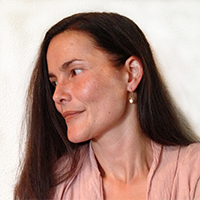Tom Howard/Margaret Reid Poetry Contest 2019
Congratulations to the winners of the 2019 Tom Howard/Margaret Reid Poetry Contest!
Honorable Mention $100
- Jamie Morewood Anderson, Sparrows, Poetry
- F.J. Bergmann, Happy Childhoods, Poetry
- Madeline Cole, Elegies, Poetry
- Monique Ferrell, minuendus, Poetry
- Margaux Griffith, Balance, Poetry
- Allison Adair, Memento Mori: Bell Jar with Suspended Child, Traditional Verse
- Lupita Eyde-Tucker, Ode to la Conquista, Traditional Verse
- Kathryn Merwin, Things I Shouldn’t Have Planted in the Garden, Traditional Verse
- M.V. Montgomery, Sonnets on Cinema, Traditional Verse
- Tamara Sellman, Suddenly, She Can’t Finish Sentences When She Tries to Order Starbucks, Traditional Verse
Judge Soma Mei Sheng Frazier comments on the winning entries
When our transactional, sometimes mercenary world curls us into fetal position, there's nothing like poetry to straighten us out; to remind us that what's crucial isn't always tangible, and what's lasting may be the very last item on our To Do list. Poetry helps recalibrate our humanity. How fortunate I've been, then, to immerse myself—some days, for ten or eleven hours straight—in a wealth of poems submitted by writers working all around the globe. In 2019, the contest received 5,516 poems—some of which became my constant companions, trailing me long after I'd dimmed the screen or filed away the printed page; tugging at me to steer me back, and back again, to their respective destinations.
It's my hope that 2019's winning entries will pull you away from your spreadsheet, your desk, your phone, to a treacherous garden where vignettes (in French, "little vines") intertwine: the mountain laurel dancing in its velvet-pink slippers, the gardener skirting a poisonous petal with her teeth. Beyond the garden, you'll travel roads where one poet drives the North Star across a border while another returns home to "a wooden cross, / wildflowers on the side of a highway." Further still, you'll meet a man who thirsts to drink a river, uncovering the child at the bottom; a farmer who buries sparrows at dusk, turning "them down with the plow, / the soil winching up, each rotation linking me / to my own fragile existence."
Each winning poem contains something I've never encountered: not in any earthly territory, or in the surreal provinces of dreams; not in the classroom, or out on the quad; certainly not in the canon. So when you can, I urge you to close the newsfeed and open these singular works. Trade the stock index for "The thumb / Brushing against / My forehead / On Ash Wednesday," the addendum to the memorandum for "the reproach of brine rotting between boards," the coffeemaker for the mother who is a dripping faucet following you to every room, the fluorescent overheads for the blazing newday daylight.
The Winners
"Migration Patterns" by Melissa Studdard
Tom Howard Prize for verse in any style
Things that will make or break a poem: rebellion. Unbending optimism. Prescriptions of song as panacea. Guiding stars. Goats, mentioned repeatedly. Detailed descriptions of dreams. I won't divulge which of these "Migration Patterns" employs; only that it does so in just such a way as to amaze. This is a poet who pulls off, with grace, what so many of us ache to write—to manifest—but don't quite dare.
"Psychogeography" by Chelsea Dingman
Margaret Reid Prize for verse that rhymes or has a traditional style
Mastery of traditional form typically requires some measure of hidden contortionism: master cellist Pablo Casals observed, "The most perfect technique is that which is not noticed at all," while master painter Pablo Picasso noted, "The more technique you have, the less you have to worry about it. The more technique there is, the less there is." These truths are manifest in "Psychogeography", a poem that renders the heavy constraints of a line unit palindrome as weightless as a prima ballerina executing inimitable turns and techniques.
Honorable Mentions: Tom Howard Prize
"Sparrows" by Jamie Morewood Anderson
Like birdsong, this poem filled my morning. I had read it the evening before, at the close of a grueling workday that I'd fully intended to forget. But when it returned on its own, waking me softly as the sun, lighting my mind with its gentle imagery, its pitch-perfect tones, I knew it would not be dismissed.
"Happy Childhoods" by F.J. Bergmann
Once, when my daughter was not quite five, we discussed her future career. She was then, and is now, committed to becoming a ninjaneer. This was something she'd heard about, which she assumed required stealth, agility and math skills. Fitting, then, that the speaker in "Happy Childhoods" once imbued her father's classic bedtime tales with unfamiliar meanings—morphing them, splicing and dicing them into something that rang even truer.
"Elegies" by Madeline Cole
It is tempting, when judging poetry competitions, to lean toward longer works: sonnet cycles, two- or three-page poems. But sometimes a handful of sparse stanzas comprises a thaumaturgic revelation, a deep lament—or, as with "Elegies", both.
"minuendus" by Monique Ferrell
"and so it is," this poem begins, meaning Amen or It is done. Yet the good man diminished by tragedy in "minuendus" dupes himself into believing otherwise; into pride, patronizing arrogance and uninvited penance. Ultimately, what we take away is his hard-earned lesson.
"Balance" by Margaux Griffith
"Balance" is exactly what this poem does: between structured rhyme and ragged lines, shame and awe, entrapment and release. In a dim-lit library, I whispered the lines to myself. To see it on the page is a gift; to hear it, a greater gift. Afterward, under the librarian's strict and knowing gaze, I felt I was bursting; had to "look down / tell my body to stop / rocking / to a song I don't recognize / a sound trapped inside me / I can't let out of my mouth."
Honorable Mentions: Margaret Reid Prize
"Memento Mori: Bell Jar with Suspended Child" by Allison Adair
Memento mori, translated roughly from Latin, means "remember that you must die." Poems in this tradition remind us of our mortality, the urgency of living, and what waits on the other side. Certainly, they can be grim—and at first, the poet spares us nothing: "Shouldn't we end on a shelf?" But along the way to inevitable closure, we discover some small mercies: meager fires surging; love that seeks reunion, seeks to protect. "Somewhere, there is a long hall, filled with jars of all sizes," the speaker warns. "I will save you this end."
"Ode to la Conquista" by Lupita Eyde-Tucker
This ceremonious ode, with its rich imagery, shrewd metaphor and mesmerizing anaphora, lays bare the savagery of human exploit. Like Ferrero's opera, like colonization itself, the poem gives and takes—yielding beauty "to bet a kingdom on," then reproaching with "brine rotting on boards / shrieks of secret spoils in island forests."
"Things I Shouldn't Have Planted in the Garden" by Kathryn Merwin
List poems offer kindergarten teachers an opportunity to discuss the importance of sequencing and professors the opportunity to introduce Whitman's "Song of Myself" or Ginsberg's "Howl". While the simplest take inventory of objects, the most complex catalogue more intricate items: days spent trying not to dissolve; nights in Coyoacán, the salt-air churning; an abuela who, "In her blue gown, with the white glow of her hair…is just another piece of the February sky."
"Sonnets on Cinema" by M.V. Montgomery
"Sonnets on Cinema", an ekphrastic sonnet cycle, is not metrical, but mathematical; not Pushkin or Petrarchan, but penetrative—each fourteen-line installment turning our thoughts, and the sonnet form itself, in new directions. Here, prose is poetry is film analysis is philosophy is art.
"Suddenly, She Can't Finish Sentences When She Tries to Order Starbucks" by Tamara Sellman
Found poetry illuminates the art inherent in everyday life, curating something wry or earnest, something "meta", from the quotidian. Set in an ubiquitous chain café, this poem plays with the retrieval of words that hide out just beyond the mind's grasp; words that, once recaptured, "function like signposts, signaling / the direction to go." Like the gaps in our memories, the gaps on the page speak as loudly as the text—in a rhythm you'll find eerily familiar.
Read our press release about the winners.
Learn more about the Tom Howard/Margaret Reid Poetry Contest.
Contest Judges

Soma Mei Sheng Frazier
Soma Mei Sheng Frazier is the final judge of our Tom Howard/Margaret Reid Poetry Contest. Soma's third prose chapbook, Don't Give Up on Alan Greenspan, was selected as the winner of CutBank's 2018 contest and released in 2019. Her previous fiction chapbooks—Salve (Nomadic Press) and Collateral Damage: A Triptych (RopeWalk Press)—earned praise from Nikki Giovanni, Antonya Nelson, Sarah Shun-lien Bynum, Molly Giles, Michelle Tea, and others. In 2015 she founded COG, a multimedia literary publication that she ran with her undergraduate students at Cogswell, which has featured Dave Eggers, Opal Palmer Adisa, Gish Jen, Denise Duhamel, and many more. Read this selection of poems and listen to her read with other Nomadic Press authors on KPFA 94.1 FM. Read Soma's brief Glimmer Train essay on literary craft.
Soma recently relocated from California to New York for a professorship at SUNY Oswego. Her sweet tooth demands sugar in everything but literature. She is now busy revising a novel.
Contest Judges

Jim DuBois
Jim DuBois assists with the judging of our Tom Howard/Margaret Reid Poetry Contest and previously with our North Street Book Prize. He studied writing and computers at Hampshire college. Now he spends his time inventing games, writing poetry and making art.









